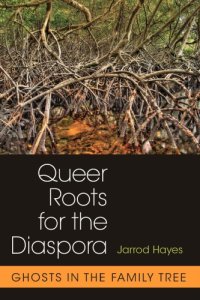
Ebook: Queer Roots for the Diaspora: Ghosts in the Family Tree
Author: Jarrod Hayes
- Tags: literary criticism, LGBTQ, Africa, Jewish, queer theory, identity, subjectivity, queer interracial desire, Francophone
- Year: 2016
- Publisher: University of Michigan Press
- Language: English
- pdf
Employing rootedness as a way of understanding identity has increasingly been subjected to acerbic political and theoretical critiques. Politically, roots narratives have been criticized for attempting to police identity through a politics of purity—excluding anyone who doesn’t share the same narrative. Theoretically, a critique of essentialism has led to a suspicion against essence and origins regardless of their political implications.
The central argument of Queer Roots for the Diaspora is that, in spite of these debates, ultimately the desire for roots contains the “roots” of its own deconstruction. The book considers alternative root narratives that acknowledge the impossibility of returning to origins with any certainty; welcome sexual diversity; acknowledge their own fictionality; reveal that even a single collective identity can be rooted in multiple ways; and create family trees haunted by the queer others patrilineal genealogy seems to marginalize.
The roots narratives explored in this book simultaneously assert and question rooted identities within a number of diasporas—African, Jewish, and Armenian. By looking at these together, one can discern between the local specificities of any single diaspora and the commonalities inherent in diaspora as a global phenomenon. This comparatist, interdisciplinary study will interest scholars in a diversity of fields, including diaspora studies, postcolonial studies, LGBTQ studies, French and Francophone studies, American studies, comparative literature, and literary theory.
Jarrod Hayes is Professor of French Studies at Monash University, Australia.
“In this exhilarating study of queer diasporas, Jarrod Hayes uproots the desire for roots, revealing new imagined communities through an investigation of origins that create their own fictions of beginning. Bringing together deconstruction and queer studies with cultural productions from the Francophone and Anglophone colonial worlds, Hayes forges new critical terrain in wonderful and startling ways.”
—David L. Eng, University of Pennsylvania
“The dialogic interplay between roots and routes—between the desire for origins and the displacement that motivates such desire—lies at the heart of Jarrod Hayes’ penetrating study of diasporic literature and the sexual, political, and national paradoxes that structure its narratives. Combining queer and deconstructive reading methodologies, Hayes takes us on a remarkable journey in which Caribbean mangroves, Moroccan Sephardic settings, Alex Haley’s Roots, the Armenian genocide, and the haunted geographies of the American South together evoke a globally queer diaspora that resists genealogical thinking and redefines identity itself.”
—Joseph Allen Boone, author of The Homoerotics of Orientalism (2014)
“This is a fascinating and impressive piece of work, which makes an important contribution to queer, post-colonial, and diaspora studies.”
—William Marshall, University of Stirling
“This is a mature work that represents the best of comparative literary studies, and is an exemplar for a mode of writing that shows commitment to a very personal inquiry [and] touches the political such that it is productive for the larger community.”
—Vinay Swamy, Vassar College
The central argument of Queer Roots for the Diaspora is that, in spite of these debates, ultimately the desire for roots contains the “roots” of its own deconstruction. The book considers alternative root narratives that acknowledge the impossibility of returning to origins with any certainty; welcome sexual diversity; acknowledge their own fictionality; reveal that even a single collective identity can be rooted in multiple ways; and create family trees haunted by the queer others patrilineal genealogy seems to marginalize.
The roots narratives explored in this book simultaneously assert and question rooted identities within a number of diasporas—African, Jewish, and Armenian. By looking at these together, one can discern between the local specificities of any single diaspora and the commonalities inherent in diaspora as a global phenomenon. This comparatist, interdisciplinary study will interest scholars in a diversity of fields, including diaspora studies, postcolonial studies, LGBTQ studies, French and Francophone studies, American studies, comparative literature, and literary theory.
Jarrod Hayes is Professor of French Studies at Monash University, Australia.
“In this exhilarating study of queer diasporas, Jarrod Hayes uproots the desire for roots, revealing new imagined communities through an investigation of origins that create their own fictions of beginning. Bringing together deconstruction and queer studies with cultural productions from the Francophone and Anglophone colonial worlds, Hayes forges new critical terrain in wonderful and startling ways.”
—David L. Eng, University of Pennsylvania
“The dialogic interplay between roots and routes—between the desire for origins and the displacement that motivates such desire—lies at the heart of Jarrod Hayes’ penetrating study of diasporic literature and the sexual, political, and national paradoxes that structure its narratives. Combining queer and deconstructive reading methodologies, Hayes takes us on a remarkable journey in which Caribbean mangroves, Moroccan Sephardic settings, Alex Haley’s Roots, the Armenian genocide, and the haunted geographies of the American South together evoke a globally queer diaspora that resists genealogical thinking and redefines identity itself.”
—Joseph Allen Boone, author of The Homoerotics of Orientalism (2014)
“This is a fascinating and impressive piece of work, which makes an important contribution to queer, post-colonial, and diaspora studies.”
—William Marshall, University of Stirling
“This is a mature work that represents the best of comparative literary studies, and is an exemplar for a mode of writing that shows commitment to a very personal inquiry [and] touches the political such that it is productive for the larger community.”
—Vinay Swamy, Vassar College
Download the book Queer Roots for the Diaspora: Ghosts in the Family Tree for free or read online
Continue reading on any device:

Last viewed books
Related books
{related-news}
Comments (0)